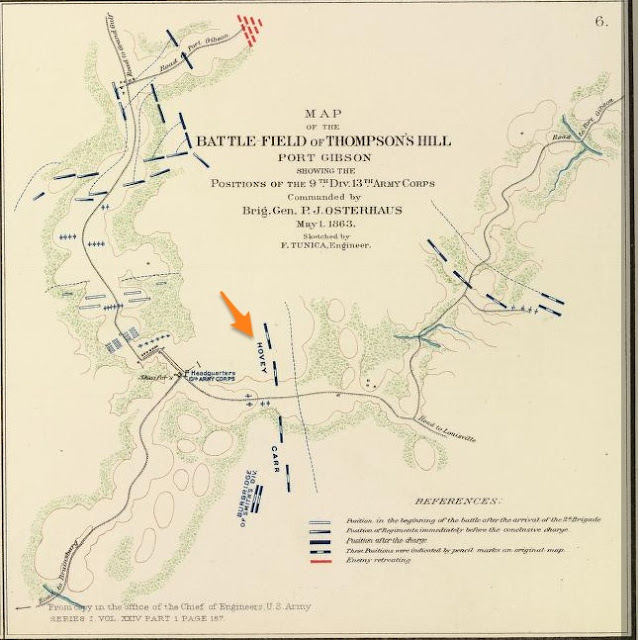On Friday, May 1, 1863, my great great grandfather Dick Worden's 24th Iowa Volunteer Infantry Regiment was part of the Union forces marching toward Port Gibson, having landed unopposed at Bruinsburg on the east bank of the Mississippi River the day before. Grant's final assault on Vicksburg had begun.
[Illus. in: Harper's pictorial history of the Civil War / Alfred H. Guernsey and Henry M. Alden. Chicago : The Puritan Press Co., c1894, v. 2, p. 457. Source: Library of Congress Prints and Photographs Division Washington, D.C.]
[Map of the battle-field of Thompson's Hill, Port Gibson showing the positions of the 9th Div., 13th Army Corps commanded by Brig. Gen. P.J. Osterhaus, May 1, 1863. Sketched by F. Tunica, engineer. Julius Bien & Co., Lith., N.Y. (1891-1895).
Source: David Rumsey Historical Map Collection.]
As we've seen, Dick Worden's regiment was part of General John Alexander McClernand's Thirteenth Corps and was commanded by Brigadier General Alvin Peterson Hovey. Here's what a 1903 history of Iowa* has to say about its role that day:
The Twenty-fourth supported artillery at the Battle of Fort Gibson and was here first under fire. Not a man flinched and but six men were lost.Harper's pictorial history of the Civil War provides us with a more general view of the battle.
After Port Gibson, General Grant decided not to attack Vicksburg from the south, ordering his army to head toward Jackson, Mississippi, via the Old Port Gibson Road.
*History of Iowa From the Earliest Times to the Beginning of the Twentieth Century (1903). Benjamin F. Gue. Wikisource.
© 2016 Copyright, Christine Manczuk, All Rights Reserved.




No comments:
Post a Comment